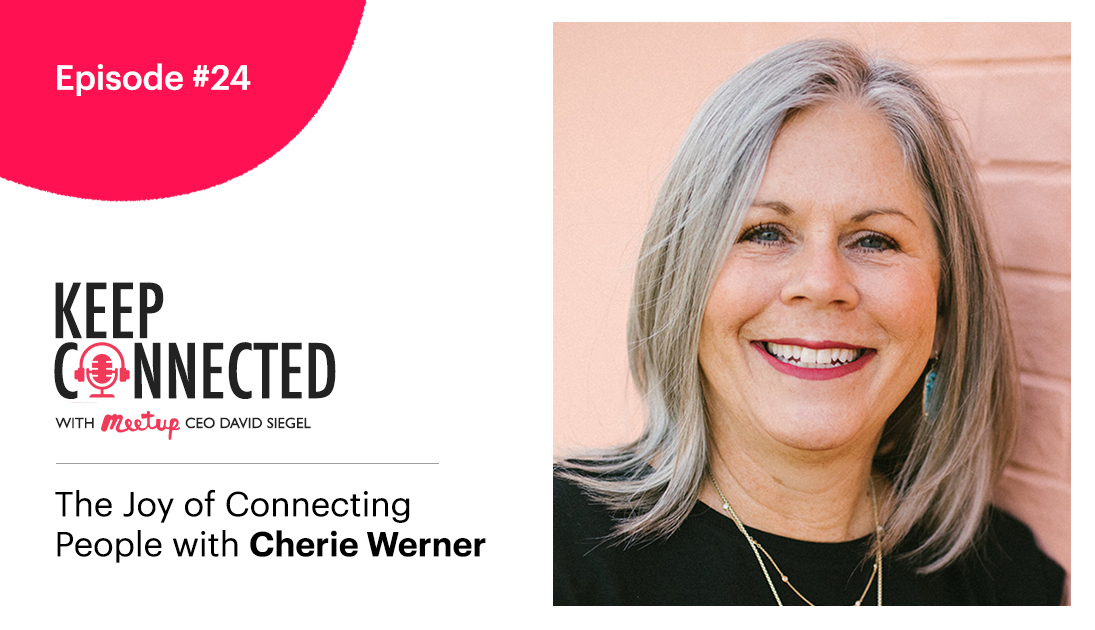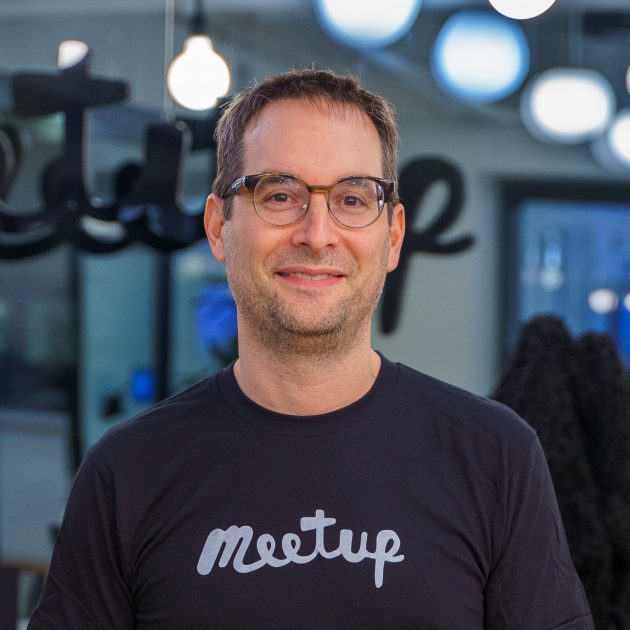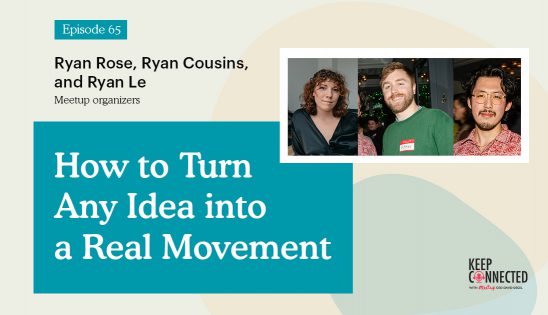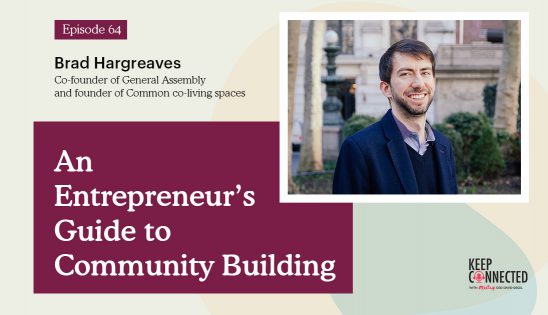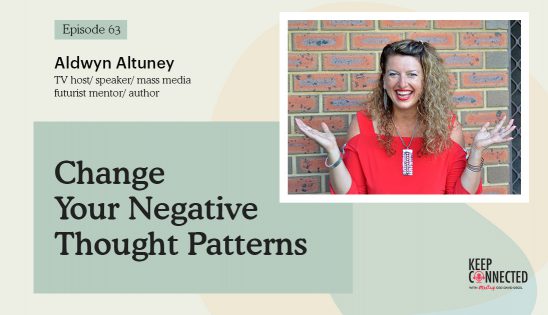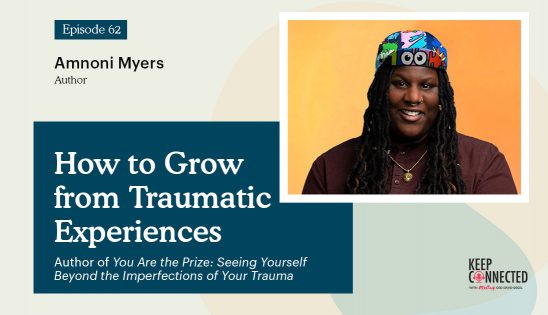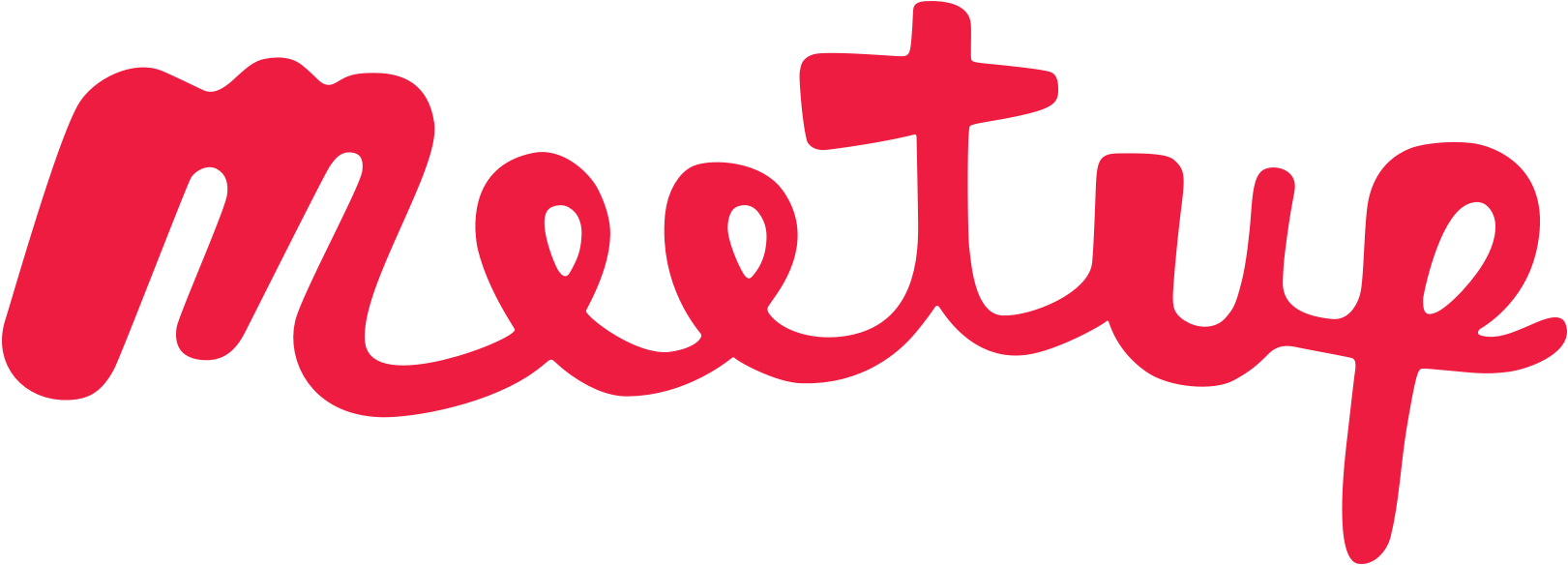Cherie Werner is a people connector. Her monthly events draw students, entrepreneurs, investors, and networkers to her Austin-based Meetup group, which now has more than 1500 members. Learn how Cherie practices deep listening skills to match members with like-minded people. Discover what listening to others can teach you about yourself.
Ranked as one of the top 25 CEO podcasts on Feedspot, Keep Connected with Meetup CEO David Siegel is a podcast about the power of community. For more details on other episodes, visit Keep Connected on the Meetup Community Matters blog.
We hope you’ll keep connected with us. Drop us a line at podcast@meetup.com. If you like the podcast, be sure to subscribe and leave us a rating on Apple Podcasts!
Learn more about Keep Connected host David Siegel’s experience as a leader and decision maker in his book, Decide & Conquer. Pre-order your copy today!
The Joy of Connecting People with Cherie Werner
In this episode, we are talking to Cherie Werner, the Organizer of a Meetup group based in Austin that welcomes entrepreneurs, startup founders, and people new to the city. It is called FIESTA and you are going to find out why it is a party indeed. Austin is an amazing, fast-growing city and Meetup makes it even more amazing and welcoming. Giddy up.
—
Cherie, welcome.
How are you?
I’m good. I’m even happier to have you as part of the show. We have had a lot of organizers that have been with Meetup for years. Cherie is a new Meetup Organizer. Her group FIESTA was started a few months ago and she has over 1,500 members. Let’s talk about you and FIESTA What is FIESTA? Let’s start with that?
FIESTA stands for Founders, Investors, Entrepreneurs, Startups, Techies and Austin Newcomers. That name came to me. I wanted to create a group that was going to be inclusive. We, as a family, our founders and entrepreneurs, and a lot of people that were moving to Austin were in the same situation. That’s how I came up with FIESTA It’s a fun name.
It has huge growing entrepreneurial culture in Austin. In fact, Austin is probably one of the fastest-growing cities for a Meetup event. It’s amazing how much entrepreneurship is happening. What are the benefits and what are some of the drawbacks to having a broader group, rather than saying, “We are only for early-stage entrepreneurs?”
The group that I took over was for early-stage entrepreneurs. As I thought about it, I wanted it to be about a place where connection happened because I realized the value of connection, especially coming out of COVID. We were one of the first groups to start meeting back in real life when a lot of groups were still meeting online. The inclusivity of it, that’s what I lead with, was important.
It was true to who I was, the core value of connection. It can be a launching pad because as you said, there are many Meetup groups here in Austin, and it’s a growing community. Part of what I was trying to do was to help individuals find their place. You are new to a city, where do you go? Where do you start? If they start with me, I’m happy.
What advice would you give to anyone in terms of helping make people feel comfortable being their genuine selves?
Make the world a place where connection happens.
There needs to be a place where everybody feels like they are accepted and they are seen. It takes effort on an organizer’s part to connect individually with people. For me, it doesn’t happen at the Meetup events because I am very much about connecting people. If I see somebody standing alone, I go up and say hi. I invite them to a group. I’m always listening for information that people have to see how I can connect the dots. My mind works that way. It’s weird but it’s fun.
People leave genuinely feeling like they left with 1 or 2 connections and that’s a win. We all have our different superpowers. I would say that was one of my superpowers is like, “You are at UT going to school, getting your Master’s and this person at UT. Let’s bring you guys together.” We have students from UT coming. Everything from students all the way up to seasoned entrepreneurs. Every so often, investors walk into the group to listen to others. You never know who you are going to meet.
It has only been a few months but do you have any stories of people that have met and because of that meeting X, Y, Z happened. Anything so far or too soon to tell?
I have had people write to say, “I just got here. I didn’t know anybody but this was a welcoming place and I left with several connections. Thank you so much.”
When you get out and you meet people, lucky things could end up happening. Through relationships, lucky things are going to happen. Let’s talk about you a little bit more. I learned that you’ve got a certification in Happiness Studies and you are learning that. There are so many different things about you. Thinking about your life, is there something that you would point to that led you to be so involved in helping to connect other people, build community, helping people to network and socialize with each other? Why does this mean so much to you on a personal level?
We all have our childhood stuff. I struggled with belonging. My mom and dad had to get married because she got pregnant with me. My dad didn’t want to be in another relationship. There were these things that happened in my childhood and my parents divorced early on. A common theme for me as a child was, “Where do I belong? Where do I fit in?” Over time as I began to heal and grow, I think that whatever we go through is an opportunity for us to help those who come after us.
If you don’t feel like you belong to something, then create something that people can belong to. That’s how I have led my life because this isn’t the first Meetup group. You guys weren’t around when I was doing my first Meetup groups. I had a group for home educators that we had 75 families. We didn’t have all of this technology. I did that out of the need to want to provide a community for my daughters.
The fact that you went through that, first of all, thank you for sharing so much. It’s a wonderful example hopefully of turning a personal, painful experience into how you could have thousands of people that don’t have to go through that because they don’t necessarily have community. The example you gave of the group that you had started a while back where you are homeschooling your kids is such a great example of the need for community.
The result of homeschooling is that some kids may not have an opportunity to be able to spend time and hang out with other kids their age. That’s always a fear. People that I know who were homeschooled sometimes built as many friendships, if not more friendships from other people who are homeschooled or other people that live nearby. It sounds like you took that and said, “Community is important. I need to make sure to build that community in all different stages of your life.” It seems that being a parent or child probably had significant impacts on how you approach business and community.

Without a doubt. I was thinking that even with having that community, I felt like it was important to be involved in our given community, the Austin community. We serve together with the homeless population. In our neighborhood, when people moved in, we were the welcoming committee. The connection, the value of humans, and humanity were so high for us that as a parent, I led with that.
My daughters are probably the most social individuals you will ever meet. It’s fun. There’s a saying that we have always had that, “Our ceiling is their floor.” Our kids can’t go any higher than we have gone, which is why learning has been so important in my journey. Learning to be a better mom, community leader, and wife, there are all these different areas of life.
Everything is related, one to another. One of the things that I personally love about business is how I can apply certain aspects of being a father to hopefully try to be a better manager, a better leader to my team. Also, aspects of trying to even be a better adult son, I’m in my mid-40s, and my mom, thank God, is in here arly mid-70s. It’s a constant process of trying to become a better person. All of that overlaps with business because to be effective in everything that you are doing, you need to continue to figure out how to grow and building community is important in both personal and professional.
Taking examples of how you are both a child and a parent, and transitioning them into how you can help other people, it’s special, so thank you for sharing it. You have gone from a small group that you took over to a large and growing group. Tell us about how you market your group and events. How do you grow as a better group?
Since taking over, we have grown it by 48% in three months. Several different things are happening here. People are going back out. People are wanting to meet in real life. We have been pent up. Especially entrepreneurs and founders tend to be Gen Z, Millennials and they want to get out and about. There are several different things. One, I go to various Meetup events.
As I meet people, I am like, “Are you from Austin?” First question, usually, no. Second question, “What are you working on?” Usually, it’s a startup. I’m like, “I have a Meetup group that meets once a month. Why don’t you come and join us?” I give them my card, and they connect with me on LinkedIn and I follow up with that individual.
I marketed myself during the week. It helps that people who are part of the group because of the consistency, if you meet somebody out and about, you can say, “There’s this Meetup event once a month at Capital Factory, 5:30 on Tuesday.” That helps to market itself. We are meeting at Capital Factory, which is one of our sponsors.
They provide the space and it’s a beautiful space Downtown in the Omni Hotel. It accommodates a lot of people. They themselves are a community for entrepreneurs and they are very much about seeing entrepreneurs be successful. They market for us in their newsletter. Their newsletter goes to several thousand people. It’s a lot of different things that are happening. I won’t take credit for any one thing.
You can take full credit. You are doing many things right. I want to summarize some of the things that are doing right for people because there are many things to learn from. Number one is 25% of Meetup organizers start is taking over a preexisting group. It’s an interesting tidbit. It’s great that you took over the group because there were already several members. There’s already momentum in the group, so it makes it easier than starting from potentially ground zero.
If you don’t feel like you belong to something, then create something that people can belong to.
Next is you are focused on the virality, of trying to get people to attend the event, and then tell as many people as they can to also join the group as well. You are turning each person who’s a member of your group into a potential marketer of your group. All the stress and pressure are not just on you but it’s also on other people to help to expand the group. You have a sponsor to have a beautiful space and you are leveraging the sponsor to also market and expand the group. You do it yourself, your members and your sponsors. It’s no surprise that you grew 50% during the pandemic.
One of the things that we talk a lot about is many years ago, the Spanish Flu and World War I caused deaths, separations, and some of the things that we have gone through in the pandemic from a hundred years ago that we are going through now. It’s not a coincidence that the Roaring Twenties happened right after that. We are now in the early stages of the 2020s because as you said, there’s so much pent-up demand of people to get back out and do things because of what happened in the pandemic. It sounds like you are absolutely seeing that in Austin.
Paul Harvey said, “In times like these, it helps to remember that there have been times like these.”
The other famous quote is, “This too shall pass.” Whatever challenges one is going through personally, or professionally that too shall pass. Whatever larger challenges happen in the world, that too shall pass. Sometimes it takes longer than we want but it will pass. We will get back to where we need to be. Let’s talk about what the ideal community looks like in your mind.
You have been a part of many communities from when you were a young mother and you are leading communities now. I have a vision of what an ideal community looks like but honestly, you have spent so much time in different communities. I would love to hear your perspective of what does a community at its best look like to you.
You have to have a buy-in. The community is nothing if you don’t have people showing up. Having people who are interested in what you are doing. When I say buy-in, I’m talking about it like, “If you need any help, this is my community. I want to help.” People feel seen. They feel like there is a place of belonging. They can be themselves. They are inviting other people into the community. It’s not just about them. Oddly, I’m doing this because given my age and I’m much older than many of these individuals.
There’s nothing odd about that at all. You are awesome. Your energy is amazing. It is a serious pet peeve of mine. Ageism exists in the world and it is one of the most unfortunate things if you look at other societies in Asia and in China where there’s this deep respect for people who may be in their 50s, 60s and 70s. It’s sad to me how in this country and other countries, there is such a lack of appreciation and respect for people who have more experience. You are amazing, so it’s not a surprise at all. Let’s debunk that completely.
Where I was going with that is because some of the things I have seen over time is the lack of common courtesies. Meaning, appreciation or gratitude is shown. Being a host of a group like this, you have to be doing it for the right reasons. Otherwise, it’s going to be a very thankless job.
Are you not doing it for the big money?
The community is nothing if you don’t have people showing up.
Absolutely not. We didn’t want to charge people but we wanted to give people the opportunity to contribute if they wanted to. We have a QR code with a donation of $5 if people wanted to give. People, in general, don’t do that. Those were some of the common courtesies of leading that. When you are leading, make sure that you are doing it for the right reasons. Make sure that you know the type of group that you are wanting to have.
I’m always reevaluating, too. After each group meeting, I say, “What can I do differently? What went well? I even ask the members like, “Is there anything that’s missing that you would like to see? In our last meeting, I saw a lot of the same faces and that is when you know that you have made a community because people are coming back. They want to connect.
A community for me is where the same people keep coming back but it’s also being infused with new energy and new people. You don’t want it to be that it’s a closed group, it’s the same exact people day in and day out, a week in and week out, and there’s no new energy. It’s also not a community if there’s 80%, 90% turnover and it’s new people each time. To be able to have that level of consistency is great.
I also want to hit on when you talked about evaluating how an event went, I tend to call that debriefing. The debrief is so important. In fact, it’s so important that when we have an executive team meeting at Meetup every single week, we take at least 5 to 10 minutes every week and we say, “What could we have done better in this meeting or conversation?
It’s helpful to get that feedback because it makes our conversations, that one and a half hours leadership team meeting that much more valuable. Every single month, we do a retro of our leadership team and say, “What worked well? What didn’t work well?” It’s those moments that allow us to continue to strive for improvement.
It sounds like you are doing the same thing in your group. I want to call it out because I don’t think enough groups take a step back and say, “How can we make this better?” Oftentimes we go on autopilot. We are doing the same things over and over again. Greatness happens when you can take that step back. Kudos to you for doing that.
I have my pre-meeting and post-meeting checklists. Pre is what needs to be done and post is what could be done better. What went well and what didn’t go well.
You are doing a lot of things. We haven’t even talked about the main thing you are doing, which is KOYA. You are the Cofounder and Chief Kindness Officer, which is, by the way, an awesome title. Every company should have a Chief Kindness officer. Tell us a little bit about KOYA, what the organization represents and how it helps to build community.
An interesting fact is that my cofounders are my husband and my two Millennial daughters, Caryn and Courtney. What begins in the home, often infiltrates in society. As a family, we were very connected. We had a mission statement that said, “No matter how old we get, we are going to do things together and stay connected.” We lead with the connection. KOYA was birthed out of that. My husband traveled a lot. My daughters are international travelers. One, going over 80 countries, the other 50.
We were trying to solve the problem of how do you show up for those that you care about in meaningful ways? We move so often in society. My husband has experience with a previous startup, so he’s always innovative and thinking outside the box. We wanted to be able to provide a way for people to stay meaningfully connected, to show that they care when they can’t be there, whether it’s with relationships, personal or business. With loneliness being in such high epidemic proportions, we are trying to solve that problem. That’s what KOYA is. We are working on amplifying a way for businesses to show up for their customers.

It all stems from the relationship that you have as a family, the relationship with your daughters. Before we move to the next topic, family and parenting seem so central to who you are as a person. Too often, people see them as leading to lead two separate lives. There’s my personal, my parenting, and my work life. Talk about that a little bit from your perspective. How can people become more comfortable in meshing all aspects of their life?
We are seeing changes being made, especially with working remotely. Parents can parent as well as work from home. That hasn’t always been the case. We are going to see more of an integration of those because they are not separate.
Exposing your kids to what you do day in and day out is probably a small benefit of the pandemic time. The number of Zoom meetings that I have had where someone is holding a kid or their 3, 6 or even 10-year-old is sitting in the meeting. It’s the most wonderful thing. I love it. I know the names of so many of the kids or even hearing the spouse in the background talking about something.
It’s real. People should let people know their whole selves and part of that selves is their personal selves. One of the things that I have enjoyed quite a lot about this particular time is getting to know a lot more about people’s whole selves. We are going to hit some rapid-fire questions. The first time you saw yourself as a leader.
Right now, coming out of COVID, it was this wake-up call that I realized I could allow fear and my insecurities to stop me from doing things or I could lead with my heart and that’s what I’m doing. I’m leading with my heart and my passion.
How cool is that that later in life, you are truly figuring out who you are, what you want to be doing, and how much of an impact you can have? That’s awesome. If you could access a time machine, go anywhere in the world, any time in the world, where would you go and what time?
I wouldn’t want to go in the past. I would probably go in the future.
How far in the future?
I would hope to see grandchildren, maybe great-grandchildren.
Wanting to see your grandchildren or great-grandchildren is a beautiful thing to want to have happened.
What begins in the home often infiltrates society.
To see the legacy, do we have a beautiful legacy that’s continuing?
Last question, which is what do you most want to be remembered by?
I want to be remembered by my family and friends as someone who valued my family. I put my family first, that I cared deeply about people in general and that I was able to help others. Help connect those dots and open up doors. It wasn’t about me. It was about lifting other people up.
Being unselfish can go a long way. Being unselfish as a spouse, parent, child, Meetup organizer and doing it to help others be unselfish and build community. When I think about you, that’s the word that of. It’s someone who’s constantly looking to help others and putting themselves secondarily. You also realize that putting yourself secondary elevates you beyond how much you could even elevate yourself. Thank you for being the person that you are. Thank you for all that you have contributed towards Meetup and to helping people in the community. I know it’s going to continue for many years to come. Thank you for everything.
Thank you so much for this opportunity. Thank you for what you are doing and for helping us as community builders to have the tools necessary to lead great communities.
—
Thank you for reading. Cherie is someone who struggled with belonging when she was a child. She then prioritized that challenge that she had to turn into what became her greatest strength, which is building a community. It’s such an inspiration for many of us that have challenges and struggles, and how to turn those into what becomes our greatest strengths. Thank you, Cherie, for teaching us that. I hope you enjoyed reading. If you did or even if you didn’t, it doesn’t matter. We still want you to provide a review. We also want you to subscribe, so you can keep reading about our blog. Remember, let’s keep connected because life is better together.
Important Links:
- Cherie Werner – LinkedIn
- FIESTA
- KOYA
About Cherie Werner

As a lover of people and a natural connector, Cherie Werner has always desired to help others feel seen, thought of, and experience a true sense of belonging. Three years ago, she and her family embarked on an entrepreneurial journey to do just that when together they founded KOYA. A lifelong learner, Cherie is also a certified life coach and community builder. She and her husband of 36 years, Jon, enjoy guiding couples considering marriage to help them set realistic expectations. She has also worked for over a decade with youth and served over 20 years as a home-based educator/facilitator. Though she has experienced many things during her lifetime, Cherie believes being a mom is her most significant role and greatest accomplishment. Having three ambitious, globe-trotting daughters aged 32, 30, and 20 has provided a unique perspective on life on the difference between raising kids pre-screens and raising them in a world driven by screens and social media.
Cherie graduated from The University of Louisiana at Lafayette with a degree in Business Administration and Marketing in 1985. She was the first in her family to graduate from college. A fun fact, as a lifelong learner, she does a deep dive into whatever she is currently interested in, i.e., marriage, parenting, Enneagram, neuroscience, community building, etc..
Last modified on December 13, 2021

